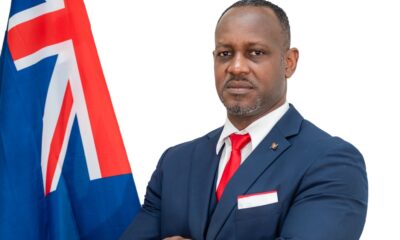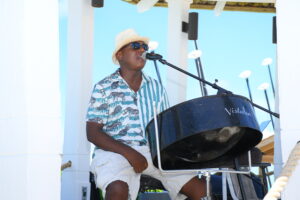News
National Debate: Misick vs Astwood is a Good Watch BEFORE you cast that Vote
Published
12 months agoon

Deandrea Hamilton
Editor
Turks and Caicos, February 4, 2025 – Both Political leaders have claimed victory following a 2-hour National Debate, hosted by Radio Turks and Caicos on Thursday January 30, 2025 and streamed live on Facebook. Supporters of both the incumbent, Washington Misick, the PNP Party Leader and Turks and Caicos Premier and challenger, Edwin Astwood the Opposition leader of the People’s Democratic Movement are declaring that it was their representative who most ably demonstrated he is the best man to lead the country into the next decade.
Published polls are varied too, but they all, up to Friday afternoon had awarded Washington Misick (PNP) the winner of the National debate which was moderated by Almando Rigby, a John Maxwell certified Leader and Damian Wilson, a former deputy Director of the government owned radio station.
owned radio station.
A vote orchestrated on Friday by @IAmLTBourne on X had 40% of his voters siding with the PDM, 60% siding with the PNP. One hundred and fifty people participated in the poll up to the time we looked in. The same poll was made available to Instagram users by iamltbourne. This time, 140 people voted with 59% supporting the PNP leader as the winner; 41% of the vote went to Astwood of the PDM.
Lightbourne has 1,289 and it is unknown how many people would have had access to the link which was shared, inviting people who watched the debate to vote for their winner.
Magnetic Media aimed to get its own feedback. Members of the electorate who tuned into the debate and who returned a comment to us were almost even in their choice of who was the better man of the two candidates.
When Misick was preferred, it was explained to us that he showed himself to be a more seasoned leader with reports on accomplishments. When Astwood was preferred, it was said to be due to his unrelenting reminders of Misick’s shortcomings over the past four years and his apparent ability to get under his challenger’s skin. Yet more were disappointed with the overall outcome of the face off, feeling no more convinced about which side should get the votes and which man would make the better premier.
The range of topics covered seemed to be satisfactory for the viewers. However the promises about each plan fell flat, for too many courted by Magnetic Media.
Even the candidates were not impressed with each other; but then again that was to be expected. Here was a particularly memorable string of swipes as the hopefuls entered a verbal foray on the illegal migration problems.
“There is nothing that he said tonight that should give you any confidence in him, nothing whatsoever,” said Washington Misick, TCI Premier, who added, “He doesn’t have a plan and I am so disappointed because I thought we were coming here to have a real debate based on plans.”
Opposition Leader, Edwin Astwood countered over the course of the 2 hours and 20 minutes that his party has plans and repeatedly accused the premier of “lies”.
“I’m not sure who has been in power over the last four years, maybe it is his brother the former premier, the honourable Michael Misick, maybe it is him because surely from what the honourable premier is saying here, he hasn’t been in office and he hasn’t been in power over the last four years,” said Astwood in rebuttal to Premier Washington Misick’s response to the issue of illegal immigration.
“The reality is that our people are waking up in the mornings and seeing droves of people running across, our people are reporting hearing their dogs barking and when they come out they see people in their yards; our people are calling it, they have a name, the ‘back pack people’ now. They’re afraid to go walking in the mornings, not because of dogs, not because of animals but because they don’t know who they are going to buck up,”said Astwood, who had earlier called the PDM the party of Protection, Detention and Management as he chided Misick.
“But yet the premier is saying they have stopped the boats and they have turned them around. That is not so, that is not the reality. I don’t know which Utopia the premier is living in but that is not the reality of Turks and Caicos Islanders.”
Ahead of this scorching observation, there was a report from the premier on his government’s progress when it comes to stemming the flow of illegal migration. He too had a response laced with biting words, aimed at clipping the wings of the PDM’s high tech plan for curbing illegal migration.
of illegal migration. He too had a response laced with biting words, aimed at clipping the wings of the PDM’s high tech plan for curbing illegal migration.
“My acronym on the PDM is not prevention, detection and management, it is Poor Decision Makers because he hasn’t said one thing here tonight that is practical, that is grounded in substance, that is even implementable. He is dealing in generalities and he is expecting the public to buy into that.”
Misick said there are new police stations coming and he named them Blue Hills and Five Cays.
“We have drones in the air and we will be providing additional drones, we already have a Google system that we are working on that you can literally drive through Dock Yard or anywhere and see from the map where cars are, where people are sitting down outside their yard and what is going on there. We are using technology in fighting crime.”
Residents, particularly the 9,353 voters, should make time to watch the debate which is still available on Facebook at RTC Station. The Moderators questioned the leaders on other pressing matters like Education, Immigration, Youth Development, Healthcare, Housing, the Cost of living and an Independent Turks and Caicos Islands.
The National Debate was hosted by government-owned Radio Turks and Caicos and had over 38,000 views and nearly 5,000 comments.
You may like
-


Opposition Leader Meets with Governor, Calls for National Strategy to Curb Gun Violence
-


Statement from the Leader of the Opposition on the Recent Tragedy in Providenciales
-


Supreme Court Rules Out New General Elections in Turks and Caicos
-


Two Realities, One Country: Opposition Leader Slams Government’s ‘Disconnected’ $540M Budget
-


“Nothing to Play With”; Everyone may have to Vote Again
-


InterHealth Canada awarded $17.1 Million; former Health Ministers explain why
News
Commonsense, Not Confrontation: Why Kamla Persad-Bissessar Is Right
Published
1 month agoon
December 27, 2025
This debate did not start with Donald Trump, and it did not start this month.
For more than a decade, this reporter has had a front-row seat to repeated, urgent calls from across the Caribbean for stronger intervention by the United States in response to gun- and narcotics-fuelled violence that has hollowed out our communities. Long before today’s headlines, leaders warned that transnational gangs were outgunning police, draining public resources and stealing our youngest people.
Much of the public messaging leaned toward calls for fewer guns flowing from the United States, but the practical response from Washington evolved into something else: tactical undergirding of the Caribbean. Training, intelligence sharing, maritime surveillance and joint operations expanded under successive U.S. administrations — Republican and Democrat alike.
Then came Venezuela.
President Nicolás Maduro proved himself an unhinged and destabilising force, openly threatening Guyana’s oil-rich territory and pushing the region to the brink of a conflict no Caribbean state could afford. The United States showed up. The threat of war was blunted. That mattered.
But while geopolitical flames were contained, the narcotics trade exploded.
CARICOM convened emergency meetings on transnational gang violence. Crime became so pervasive that it was formally classified as a public health threat. Entire communities were terrorised. Courts clogged. Police forces stretched beyond capacity.
And now — quietly but noticeably — the tempo has shifted.
While no single forensic study can capture the full picture, it is easily verifiable on the ground that major narcotics busts and trafficking activity have slowed in recent months. Something has changed. Pressure works.
This is the reality Prime Minister Kamla Persad-Bissessar is responding to.
Her critics accuse her of breaking ranks. What she is actually doing is refusing to indulge in strategic hypocrisy — demanding international help to confront narco-terrorism while appearing to defend or excuse the very networks and actors we have spent years condemning.
Sovereignty is not an insult. The Caribbean invokes it constantly. To deny it to the United States — especially when the policies in question were telegraphed months in advance and remain adjustable — is not diplomacy. It is posturing.
What is most troubling is the region’s selective memory. CARICOM has directed months of rhetorical fire at Trump-era policies, yet when disaster struck — from security crises to Hurricane Melissa — the United States remained one of the region’s most reliable supporters. Outcomes matter more than allegiance theatre.
Kamla Persad-Bissessar is not suffering from Trump Derangement Syndrome. She is applying commonsense statecraft. She understands that small states do not gain leverage by moral outrage alone, and that credibility is lost when we appear aligned with individuals, regimes or activities we ourselves have deemed a threat.
Her warning to CARICOM is simple and necessary: do not undermine your own cause.
The Caribbean’s fight against narco-violence, corruption and instability has been long, costly and painful. If pressure is finally producing results, we should be wise enough to recognise it — and brave enough to say so.
Angle by Deandrea Hamilton. Built with ChatGPT (AI). Magnetic Media — CAPTURING LIFE.
News
Beaches Turks and Caicos Showcases and Supports Local Creativity
Published
5 months agoon
September 12, 2025
September 12, 2025
PROVIDENCIALES, Turks & Caicos Islands – The Turks and Caicos Islands are home to a wealth of creativity, from artisans and craft vendors to musicians and performers. Beaches Turks and Caicos, the Caribbean’s leading all-inclusive family resort, has pledged its continued support for these individuals by providing meaningful platforms for them to share their skills and stories with guests from around the world.
The resort’s commitment is most evident in its weekly Cultural Night showcase, where visitors are immersed in the vibrant traditions of the islands. Guests enjoy live performances which feature local music genres such as ripsaw, while artisans display and sell handmade creations. This event not only enriches the guest experience but also strengthens economic opportunities for local entrepreneurs.
Entertainment Division Manager Garett Bailey emphasized the significance of Cultural Night, “we want to showcase everything the Turks and Caicos Islands culture has to offer. Our goal is for guests to leave with a deeper appreciation of the island’s art, music and traditions, while giving local talent the opportunity to share their creativity with visitors from across the globe.”
Beyond Cultural Night, Beaches Turks and Caicos also welcomes local craft vendors onto the resort every Wednesday and Friday where they are offered a direct space to market their goods. Guests have easy access to the Turks and Caicos Cultural Marketplace, where they can purchase authentic local arts and crafts.
where they are offered a direct space to market their goods. Guests have easy access to the Turks and Caicos Cultural Marketplace, where they can purchase authentic local arts and crafts.
Managing Director, James McAnally, highlighted how these initiatives reflect the resort’s broader mission, “we are committed to celebrating and sharing the vibrant culture of these islands with our guests. By showcasing local artistry and music, we not only provide entertainment but also help sustain and grow the creative industries of the Turks and Caicos Islands. From our cultural showcases to nightly live music, we are proud to create authentic connections between our guests and the people of these islands.”
Local musician Keon Hall, who frequently performs at the resort, expressed gratitude for the ongoing partnership, “being able to share my music with Beaches’ guests has created lasting relationships. Some visitors return year after year and request songs from previous performances. This partnership continues to celebrate what we do and strengthens the bond between local artists and the resort.”
The resort’s support of local artisans and entertainers extends beyond business opportunity; it is about preserving heritage and sharing stories. Guests take home more than souvenirs; they leave with experiences that deepen their understanding of Turks and Caicos’ culture and history.
Public Relations Manager, Orville Morgan, noted the importance of this commitment, “for many visitors, these interactions represent their first genuine connection to the Turks and Caicos Islands. From artisans and musicians to farmers and transport operators, our local talent helps shape every guest experience. At Beaches, we are proud to give them the stage to share their stories and their heritage.”
Beaches Turks & Caicos remains dedicated to developing cultural connections and supporting the artisans, musicians and entrepreneurs whose creativity makes the Turks and Caicos Islands unique. Each guest experience is an opportunity to celebrate and sustain the spirit of the islands.
Caribbean News
“Barbecue” is Cooked! US Turns Over 11 Million Haitians into Potential Informants with $5 Million Bounty
Published
6 months agoon
August 12, 2025
August 12, 2025
The United States just set fire to the underworld in Haiti — and this time, the smoke might finally flush out the man many call the most feared in the Caribbean.
On Tuesday, the U.S. government slapped a $5 million bounty on the head of Jimmy “Barbecue” Chérizier, the ex-police officer turned gang boss accused of orchestrating massacres, torching neighborhoods, and strangling Haiti’s capital into chaos. This isn’t just a headline — it’s a full-blown game-changer.
turned gang boss accused of orchestrating massacres, torching neighborhoods, and strangling Haiti’s capital into chaos. This isn’t just a headline — it’s a full-blown game-changer.
That kind of cash — offered under the State Department’s Transnational Organized Crime Rewards Program — is enough to turn the country’s entire population, more than 11 million people, into potential informants overnight. Add the millions in the Haitian diaspora, and Chérizier isn’t just wanted. He’s surrounded.
The Number That Changes Everything
Five million U.S. dollars today equals about 655 million Haitian Gourdes. In a country where many scrape by on less than $5 a day, that’s not just life-changing — it’s life-defining. It’s enough to rebuild homes, put generations through school, or buy a one-way ticket far from the gunfire.
In a place where trust is scarce and survival is everything, that figure is more than tempting — it’s irresistible. For Chérizier, it means every friend could be a future informant, and every loyalist might be calculating the cost of staying loyal.
‘We Will Find Them’ — Jeanine Pirro, U.S. Attorney
Jeanine “Judge Jeanine” Pirro, the U.S. Attorney, set the tone with fire in her voice. “This indictment is the first of its kind,” she announced. “Jimmy Chérizier, also known as ‘Barbecue,’ is a notorious gang leader from Haiti who has orchestrated and committed various acts of violence against Haitians, including the 2018 La Saline attack in which approximately 71 people were killed. He both planned and participated in that massacre.
“Anyone who is giving money to ‘Barbecue’ cannot say, ‘I didn’t know.’ They will be prosecuted, and we will find them. They are supporting an individual who is committing human rights abuses, and we will not look the other way.”
Pirro wasn’t just going after Chérizier. She was sending a warning to the Haitian diaspora accused of feeding his war chest from abroad: the days of claiming ignorance are over.
‘No Safe Haven’ — Darren Cox, FBI
Then came Darren Cox, Deputy Assistant Director of the FBI, delivering the muscle of America’s most powerful investigative force. “There is no safe haven for Chérizier and his network,” Cox declared. “We are closing every link, every cell.” Since January, he said, the FBI has arrested three Top Ten fugitives, taken more than 19,000 criminals off the streets, and seized thousands of tons of narcotics — enough to save millions of lives across the U.S.
The FBI’s Miami and Houston offices have already bagged one of Chérizier’s Viv Ansanm associates inside the United States without firing a shot. “These efforts are a deliberate and coordinated plan,” Cox said, “to protect our communities and confront escalating threats from terrorist organizations like Viv Ansanm.”
‘Three-Year Investigation’ — Ivan Arvelo, HSI
Ivan Arvelo, Assistant Director of Homeland Security Investigations, brought the receipts. “This is the result of a three-year investigation into Chérizier’s procurement networks, cash pipelines, and operational financing that violates sanctions,” he explained. Arvelo described 400 structures destroyed, entire communities erased, and a gang exploiting U.S. dollars, technology, and immigration loopholes to keep its killing machine running. “We tracked how Americans unwittingly bankrolled brutality,” he said — proof that the net is tightening both inside Haiti and abroad.
‘The Worst of the Worst’ — Chris Lambert, State Department
Chris Lambert, representing the State Department’s International Affairs division, gave the political bottom line.
“Mass violence in Haiti must end,” Lambert said. “The instability resulting from Chérizier’s actions fuels illegal migration, regional instability, and transnational crime. We will continue to apply every tool available — including our rewards programs — to stop the spread of unchecked violence, especially to target the worst of the worst criminal leaders threatening the people of our hemisphere.”
instability, and transnational crime. We will continue to apply every tool available — including our rewards programs — to stop the spread of unchecked violence, especially to target the worst of the worst criminal leaders threatening the people of our hemisphere.”
Lambert confirmed what many have long known: Chérizier is not just a gang leader. He commands Viv Ansanm, officially designated in May as a Foreign Terrorist Organization. In the eyes of the U.S., that makes him not just Haiti’s problem — but everyone’s.
Why Haitians May Not Resist
In Haiti, money talks — loudly. And when you put 655 million Gourdes on the table, it shouts.
That’s the kind of figure that turns casual acquaintances into informants and makes even the most hardened loyalist wonder if the payout is worth more than the risk. It’s not a matter of “if” word gets out, it’s a matter of “who will be first to collect.”
For grieving families, it’s a chance at justice. For the desperate, it’s a chance at survival. For Haiti as a whole, it’s hope — wrapped in the most dangerous of temptations.
An Answer to Prayers
For years, Haiti’s headlines have been a scroll of horrors — kidnappings, executions, burned neighborhoods, bodies in the streets. Chérizier’s name has been attached to too many of them.
This move by the U.S. isn’t just strategy. It’s personal. It’s a signal to every Haitian — at home or abroad — that the days of impunity could be ending.
I’ll admit it: when I heard the news, I danced, I sang, and I nearly cried. Not because $5 million is a lot of money, but because of what it means — the possibility, at last, of stopping the man accused of helping turn Haiti into hell on earth.
Four officials, four angles, one mission: Pirro’s fire, Cox’s grit, Arvelo’s precision, Lambert’s conviction. Together, they’ve put the heat on “Barbecue” like never before.
BBQ is cooked. The only question now is: which one of over 11 million potential informants will serve him up?





